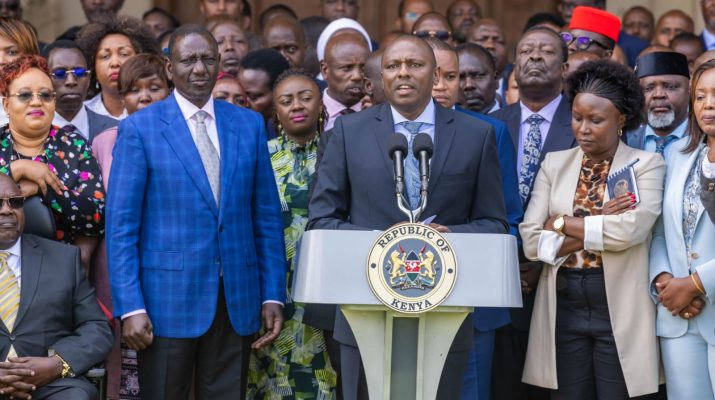By Kelly Mumbi
The Kenya Kwanza Parliamentary Group convened at State House Nairobi on Tuesday to review the changes to the Finance Bill 2024, as presented by Finance Committee Chairman Kimani Kuria.
President William Ruto while addressing the meeting, stated that the amendments reflect the feedback received from public consultations.
He praised the public for their contributions, emphasizing that the revised Bill emerged from both executive and legislative scrutiny, ensuring public participation.
“We are going to end up with a product in Parliament that came from the Executive and has been interrogated by the Legislature. Through public participation, the people of Kenya have had a say,” the President said.
The Finance Bill now excludes the proposed 16% VAT on bread, sugar transportation, financial services, and foreign exchange transactions, along with the 2.5% Motor Vehicle Tax.
There will also be no increase in mobile money transfer fees, and the Excise Duty on vegetable oil has been removed.
Levies on the Housing Fund and Social Health Insurance will not be subject to income tax, increasing employees’ disposable income.
The Eco Levy will apply only to imported finished products that contribute to e-waste, exempting locally manufactured items like sanitary towels, diapers, phones, computers, tyres and motorcycles.
President Ruto highlighted efforts to reduce imports of locally producible items to support domestic manufacturing and secure jobs. He mentioned that the Eco Levy would target imported goods, while local products would be exempt.
The VAT registration threshold has been raised from KSh5 million to KSh8 million, relieving many small businesses from VAT registration. The Kenya Revenue Authority’s electronic invoicing system (ETIMS) has been revoked for farmers and small businesses with turnovers below KSh1 million.
The Bill also imposes excise duty on imported table eggs, onions, and potatoes to protect local farmers, and excise duty on alcoholic beverages will be based on alcohol content rather than volume. Additionally, the pension contribution exemption will increase from KSh20,000 to KSh30,000 per month.
President Ruto explained the increased allocation to education, describing it as an investment in the future. KSh18 billion has been allocated for hiring Junior Secondary teachers on internships, and funds have been set aside to hire 20,000 interns next month.

President Ruto affirmed the continued collaboration between the Executive and Legislature to make sound decisions for the country. He noted that tough decisions have led to reduced inflation and a stronger shilling, and the government aims to achieve a balanced budget within three years to minimize borrowing.
The new university funding model has significantly improved public universities’ finances, allowing more funds for students from poor families as wealthier parents opt out of scholarships.
Deputy President Rigathi Gachagua noted that higher taxes on high-alcohol content beverages would aid in combating alcoholism. The increased funds for the National Government Constituency Development Fund will enable MPs to drive transformative projects in their constituencies.
Prime Cabinet Secretary Musalia Mudavadi stated that the Kenya Kwanza administration aims to make prudent decisions rather than populist ones. UDA chairperson and Embu Governor Cecily Mbarire urged legislators to pass the Finance Bill to facilitate major development initiatives.
Finance Committee Chair Kimani Kuria highlighted that the Bill aims to raise an additional KSh302 billion, bringing total projected revenues to KSh3.3 trillion. Budget and Appropriations Committee Chair Ndindi Nyoro emphasized the Bill’s role in financing key development sectors like education and agriculture.
President Ruto urged legislators to focus on implementing transformative programs, reminding them of their unity during the elections and encouraging them to serve the people unitedly.

